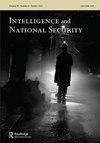模拟情报需求和优先顺序过程:美国对卢旺达种族灭绝的反应
IF 0.8
3区 社会学
Q1 HISTORY
引用次数: 0
摘要
在美国,国家安全结果往往被归类为情报部门或政策部门的责任。很少有人讨论从需求和优先级(R&P)过程中产生的系统结果,这是决定国家安全目标并建立解决它们的方法的顶级协作努力。在这里,引入了一个整体模型来检查研发过程以及情报和政策的二元功能,并针对美国对卢旺达种族灭绝反应的两项任务进行了测试:撤离美国侨民和更广泛的干预。这种宏观调查可以更好地找出国家安全结果的根本原因。本文章由计算机程序翻译,如有差异,请以英文原文为准。
Modelling the intelligence requirements and priorities process: the US response to the Rwandan genocide
In the US, national security outcomes tend to be categorised as either the responsibility of the intelligence or policy community. Few discuss systemic outcomes emanating from the requirements and priorities (R&P) process, a top-level collaborative effort that determines national security objectives and establishes the means to address them. Here, a holistic model is introduced to examine the R&P process alongside the binary functions of intelligence and policy, and tested against two mandates of the US response to the Rwandan genocide: evacuation of American expats, and broader intervention. Such macroscopic investigations can better identify the root causes of national security outcomes.
求助全文
通过发布文献求助,成功后即可免费获取论文全文。
去求助
来源期刊

Intelligence and National Security
Multiple-
CiteScore
1.80
自引率
41.70%
发文量
93
期刊介绍:
Intelligence has never played a more prominent role in international politics than it does now in the early years of the twenty-first century. National intelligence services are larger than ever, and they are more transparent in their activities in the policy making of democratic nations. Intelligence and National Security is widely regarded as the world''s leading scholarly journal focused on the role of intelligence and secretive agencies in international relations. It examines this aspect of national security from a variety of perspectives and academic disciplines, with insightful articles research and written by leading experts based around the globe. Among the topics covered in the journal are: • the historical development of intelligence agencies • representations of intelligence in popular culture • public understandings and expectations related to intelligence • intelligence and ethics • intelligence collection and analysis • covert action and counterintelligence • privacy and intelligence accountability • the outsourcing of intelligence operations • the role of politics in intelligence activities • international intelligence cooperation and burden-sharing • the relationships among intelligence agencies, military organizations, and civilian policy departments. Authors for Intelligence and National Security come from a range of disciplines, including international affairs, history, sociology, political science, law, anthropology, philosophy, medicine, statistics, psychology, bio-sciences, and mathematics. These perspectives are regularly augmented by research submitted from current and former intelligence practitioners in several different nations. Each issue features a rich menu of articles about the uses (and occasional misuses) of intelligence, supplemented from time to time with special forums on current intelligence issues and interviews with leading intelligence officials.
 求助内容:
求助内容: 应助结果提醒方式:
应助结果提醒方式:


